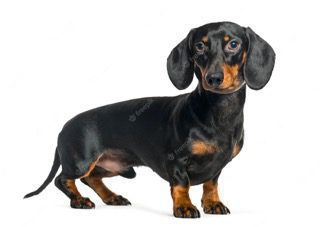
The Dachshund is an energetic and boisterous German dog breed, originally bred for the purpose of hunting badgers. These unique looking pups feature long, low bodies and short legs. The silhouette of the Dachshund strikes a dramatic appearance, and it’s hard to mistake them for any other breed. They come in two main sizes, standard and miniature, and two main coat varieties, smooth and wirehaired. When it comes to color, Dachshunds can be brindle, solids, dapples, and piebalds. What makes this breed so special is their independent and curious nature.
They have a very strong will which makes them stand out from other breeds. With their loyal and wry character, they are known as one of the most entertaining breeds in the world and are sure to bring a smile to any home. Dachshunds are energetic, friendly, and enjoy play and companionship. They are intelligent, independent, and can sometimes be stubborn, but overall they love being part of a family. They are gentle and patient with children and can get along with cats and other pets if introduced and socialized from a young age.
They thrive with consistent training and exercise, such as daily walks, runs, and playtime, and need proper mental stimulation to keep them from becoming bored. They are active indoors, but can adapt to living outside as long as they receive plenty of attention and exercise. Dachshunds form strong bonds with their owners and can often be found following them around the house. Dachshunds can be noisy, especially if they’re not getting enough stimulation and attention, so they should not be kept in apartments. When given the attention and exercise they need, these dogs can make an affectionate and loyal addition to any family.
The dachshund is an energetic and lively breed, and as such, requires a nutritious and balanced diet to thrive. To maintain their active and healthy lifestyle, dachshunds need a diet rich in proteins, vegetables, and essential vitamins and minerals. Monitor their food intake to ensure they are meeting their daily caloric needs. Furthermore, providing small, frequent meals throughout the day while avoiding human foods is highly recommended. Responsible ownership and adoption involve the understanding of a breed’s unique nutritional needs, and should be taken into consideration when selecting a companion.
If you are looking for further information regarding what foods are okay for your dachshund to eat and which ones to avoid, be sure to check out Way Canina for all of your pet nutrition needs. Additionally, Way Canina’s resources can assist in understanding how to create a balanced diet plan that fits your dachshund’s individual needs. A healthy diet is essential for any breed of dog and is key to a long and happy life for your four-legged friend.
Common health issues for Dachshunds include disc disease, patellar luxation, hip dysplasia, obesity, and eye problems. They have a strong genetic predisposition to these conditions, so it’s important to keep up with their regular veterinary check-ups and vaccinations to help prevent any of these issues from progressing. Its also important to provide a nutritious diet and get them plenty of exercise so they can stay healthy. In terms of preventive care, regular grooming is essential for Dachshunds. This includes brushing, bathing, and ear cleaning. To help keep their skin and coat healthy, they may need to be groomed more frequently throughout the year.
Dachshunds typically have a lifespan of 12 to 16 years. Factors such as genetics, diet, exercise, and healthcare can all influence their longevity and help contribute to them having a healthy, happy life. So it’s important to also keep up with their preventive care and follow the recommendation of your vet.
Are you considering owning a Dachshund? Owning a dog is a big responsibility, so before you make a decision, make sure to consider the pros and cons of owning this breed. Check out our blog posts and articles on Way Canina to compare different breeds and find additional information about dogs’ lifestyle and wellbeing.